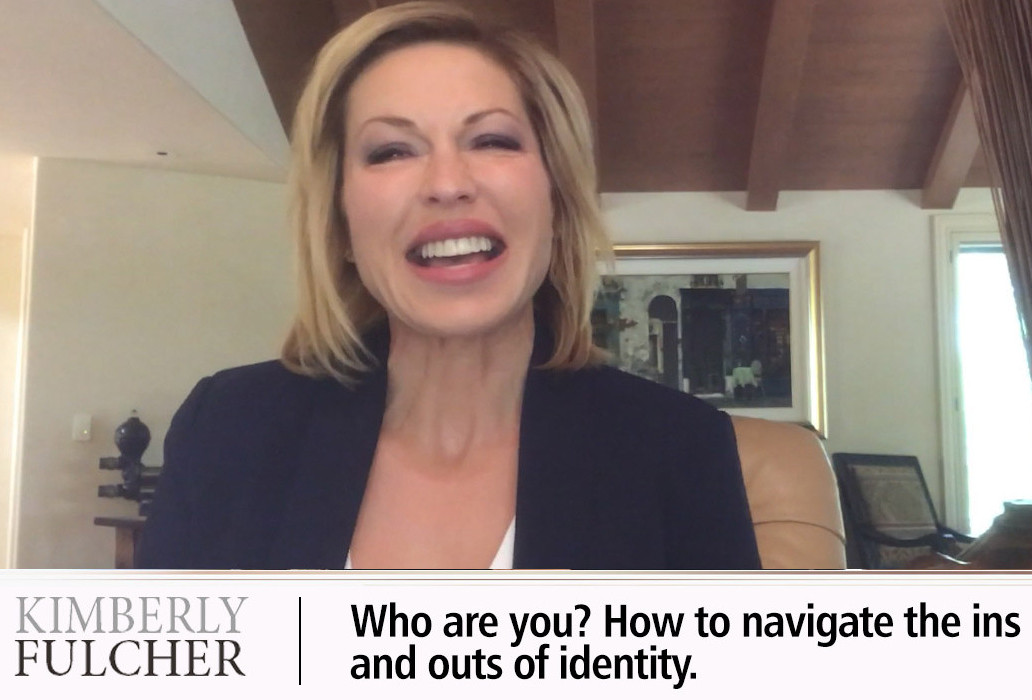Who are you? That’s a pretty loaded question, isn’t it? When you attempt to answer it, you probably refer to your identity, which is your sense of self. It’s the sum total of your personality, interests, likes, dislikes, strengths and weaknesses all rolled up into one lovely complicated package. Your identity is how you think about and see yourself.
Throughout your life, you’ll go through many changes. (And if you’re part of my free coaching program, you’re definitely gonna shake things up.) The thing is, all that shaking and changing impacts your identity. And that can feel FREAKY.
In fact, when you’re going through your own changing times, you can feel like you’re coming unglued. (You kind of are.) Change causes pieces of you to shift. Think of it like an identity earthquake. You’re going to live through it, but you’re probably not gonna like it very much.
It’s important to get your arms around your sense of identity, because it impacts how you show up in the world. It even determines whether or not you succeed in making positive changes in your life.
You see, you cannot behave outside of your identity. You always act in accordance with who you think you are. Which means you have to line the way you see yourself up with the changes you’re making if you want them to stick. (How hard do you think following a nutrition plan is going to be if you keep reminding yourself that you’re a junk-food-junkie with no food discipline?)
In our current episode of GrooveTV I’ll show you how identity works, and help you put your finger on where yours is shifting (or where it might need to). Armed with that information, you’ll be more sure-footed as you make your way down your own path of change. As an added bonus, you’ll also feel a little bit less like you’re losing your mind. Press PLAY already. Your sanity awaits. ☺
Step 1 – Know your roles.
The roles you play within your community, home, and work environments define you. You’re probably not conscious of it, but I’m wiling to bet you refer to your roles when you describe yourself. (I’m a wife, mom, teacher, editor, leader, manager, executive, doctor, lawyer, business owner, career girl, yoga teacher, etc.)
Roles are extremely important because they shape your behavior. You see, all roles come with their own set of rules and responsibilities. Rules are usually about what you think has to happen for you to be good at your role, and responsibilities are the things you think you need to do, based on those rules. They dictate what you need to produce or provide.
You can easily fall into the trap of playing by roles and rules that you haven’t given much thought to. It’s common to default to the guidelines you learned from your parents, social community, or even society in general. Sometimes that approach works, but most of the time it sets you up for stress and feeling like failure.
Meet Susan. She’s a mom who works outside the home as a marketing executive. She’s busy all day, every day, but she always feels like she’s falling short when it comes to being a good mom. Let’s take a look at her roles, rules, and responsibilities.
Role: Susan is in her mom role.
Rule: Susan’s rules for what it takes to be a good mom are;
- A good mom keeps a clean house at all times. (She has 3 children under 10.)
- A good mom makes breakfast every morning, packs lunches, and cooks dinner every night. (She works 40 hours per week.)
- A good mom can help her kids with their homework. (Two words. Common Core.)
- A good mom never loses her temper. (Accomplished by no woman ever.)
- A good mom takes her kids to school in the mornings. (Carpool is a good thing. So are school buses.)
Responsibilities:
Can you imagine Susan’s daily to-do list, or what her calendar must look like before she even gets to her office? Can you see how she’s setting herself up to feel like a failure every day, even after she’s knocked herself out? (Not to mention putting herself into a never-ending cycle of domestic enslavement.)
Susan’s rules are all based on what she saw her mom do when she was a kid. But her mom didn’t’ work outside of the home, and it was a different time in the world. In today’s day and age, Susan will fall short every day, because no human woman could make good on her rules. She needs to lighten up, and make it easier to win. Where are you doing a Susan?
Now, let’s say hello to Betty, who is a stay-at-home mom. Betty’s rules for motherhood are more relaxed than Susan’s, but they still involve doing stuff like making meals and helping with homework every day. She’s raised 3 children, and now her baby is headed off to college. Welcome to Betty’s empty nest triggered identity in crisis.
Of course she’s still a mom, but with no kids at home, all of Betty’s rules and responsibilities need a second look. The things that used to make her feel like she mattered are no longer required of her. What will she do now? Does she matter anymore? Her identity is shifting, and she is unnerved.
If Betty knew about roles, rules and responsibilities, she’d be reassured to know that she’s totally normal for having a hard time. But she doesn’t, so she’ll beat herself up for handing this normal life event poorly. When in fact, she’s handling a hard thing normally. Can you relate to Betty? Where are your roles, rules or responsibilities shifting?
Finally, let’s talk about Lisa. Lisa has been married for 26 years, and now she’s getting divorced. For more than two decades, she has defined herself as wife. Now, just like that, she’s single woman. And she is freaking out.
When one of your roles is removed from your life entirely, it creates a vacuum, and that can push you into emotional oblivion. For Lisa, surrendering the role of wife will hurt, but she can make it a little bit easier by focusing on a replacement role.
A replacement role is just like it sounds. Life doesn’t tolerate empty space. When something gets left behind a vacuum is created. Eventually something else needs to fill that void. If you don’t proactively replace your old role with a new one, you’ll either revert back to your old ways or (if that’s not an option) fall into a dark abyss thinking about the way your life used to be. Neither is a good option.
Lisa needs to focus on her new role as single woman, and set herself up with rules and responsibilities that make it easy for her to win. Then each time she gets sad about no longer being a wife (and that will happen) she needs to focus on her single girl status. Can you relate to Lisa’s predicament? Do you need to replace a role or two?
Step 2 – Pay attention to your personality.
Your personality is the part of your identity that holds all your adjectives. What are your character traits? How about your likes and dislikes? What are your interests, strengths, and weaknesses?
Personality is powerful, because it dictates how you show up in the world, what you will or won’t do, what you enjoy, and even whether or not positive life changes stick when you try to make them.
As I mentioned when we kicked off this lesson, you almost always behave in line with your identity, so if the way you see yourself doesn’t line up with what you’re going for, eventually you will undermine your own changes. (This all happens unconsciously of course, so you just end up feeling defeated when you fall of the change wagon.)
Ultimately, I want you to get clear about how you currently define your personality. Then I want you to notice where your own self-description may be holding you back, and start thinking about the adjustments you might make to line your identity up with the habits you want to condition. I break personality down into three buckets.
Likes and dislikes
Likes and dislikes sound self-evident. You either enjoy a thing, or you don’t. But there’s more to your preferences than meets the eye. Many times, you pick them up from parents, peers, or significant others without doing too much thinking.
In fact, when you look closely, it’s common to discover that most of your likes are based on adaptation rather than authenticity. Do you really like football, or have you adapted because everyone else in your family loves it? (If you can’t beat them, join them, right?) Adapted interests are fine, as long as you make room for authentic ones too.
Another challenge around likes and dislikes, is that you can jump to conclusions about what you like (or don’t) too quickly. For example, I tried Indian food for the first time when I was in my early 20’s, and I had a bad experience with it. (Bad enough to make me swear it off forever.)
Based on that one experience, I decided I didn’t like Indian food, and I didn’t eat it again for about 15 years. Then one fine day, I found myself in India, needing to choose between curry or starvation. Curry won, and it turns out I loved it! I had decided I didn’t like Indian food too quickly, based on limited information. Where might you be doing that in your life?
Interests and apathies
Interests and apathies are similar to likes and dislikes in that you can easily adapt them as a result of being around your friends or family. They’re different, in that what you’re curious about (or what you have no interest in at all) are important pieces to knowing yourself.
Your interests are clues to your life purpose, so it’s important to explore them. If you’re intrigued by travel, nurture your wanderlust by visiting new places (even if you just do it on the internet). If you’re fascinated by dance, take a class. If you love reading, put your nose in some books. You get the picture. Delve into what interests you, and be willing to give all of your current interests a second look. If you’ve accidentally fallen into one that doesn’t feel right for you any longer, you have permission to stop doing it. Life is too short to do stuff you don’t need or want to do.
Strengths and weaknesses
Your strengths are the natural abilities you were born with. They’re probably the things you get most acknowledged for, but you might minimize the compliments because they feel pretty easy for you.
Your strengths are spiritual gifts. You are good at what you’re good at for a reason. It’s vital that you recognize these attributes in yourself. It’s also important that you nurture them. When you make a practice of honing your abilities, you can develop real mastery.
It’s less fun to look at your weakness, but they hold gifts for you too. To begin with, it’s important to know what might trip you up as you’re going for your dreams. If you were a person who had difficulty with direction while driving, you wouldn’t set out on a road trip without some sort of navigational assistance, would you? Life works the same way. When you know what could trip you up, you’re less likely to be tripped up by it.
Sometimes, what you see as weakness in yourself is actually a strength gone wild. Think about the movie the Sorcerer’s Apprentice. (You are the apprentice.) You’ve been given powerful gifts, but until you learn to focus them with wise intention, you create more havoc than heaven.
What if your impulsiveness is really just an unchecked ability to take risks? What if your loudness, with the volume adjusted, could function as the ability to speak up? Maybe that stubborn streak, when focused on business, will help you to make seemingly impossible things happen.
The point here is to turn your so-called-weaknesses to work for you. It’s worth a look, to see if you might have untapped gifts right at your fingertips, don’t you think?
Self-Descriptors
This is how you define yourself. Are you an optimist or a pessimist? Are you a morning person or an evening person? Are you an introvert or an extrovert? You get the picture. Self-descriptors are important, because they really dictate what you will or won’t try. Any limiting label you’re using to describe yourself needs a second look. (A good one.) Speaking of limiting labels…
Step 3 – Reframe your negative labels.
You can limit yourself by the way you describe yourself. You do that by talking about who or what you think you’re not. As you make your way through life, normally when you encounter something you’re not good at or something you don’t enjoy, you make the connection that it isn’t your thing, and you label yourself.
Maybe you were horrible at math in school, so you define yourself as not a numbers person. Fast forward to your current adult life, where you run your own business. Guess what? All successful business requires math. Can you see how buying into the notion that you’re not a numbers person is going to hold you back from succeeding in your business?
Another way you can use labels against yourself is by defining yourself as bad. (I am stupid. I’m a mess.) Usually these stamps are criticisms parents, peers or authority figures gave you when you were a kid. It’s terrible to be taunted. Don’t take over for you’re the person who hurt you by repeating the bad stuff they told you in your own head. (Sounds silly when you see it written down, doesn’t it?) Start by catching yourself when you use a negative label. No big deal. Just notice it. Then replace it with a more empowering alternative.
The way you see yourself impacts the world you see. Take some time with this. Explore you, and enjoy your process. One of these days you’re gonna figure out how amazing you are.
That’s it for the week. Please remember that I never want you to blindly take my word for anything. Only you know what’s right for you. (I just happen to have a few coaching tools that can help you get closer to that wisdom.) Give this week’s advice a test drive. Once you do, let me know how it goes. I love hearing from you! There are four ways for us to interact.
- Comment in the comments section below.
- Chat with me on Instagram or Facebook.
- Email me if you have something more private you’d like to ask. My personal email is kim@kimberlyfulcher.com. I’m the only one reading your messages, and it’s always me answering them.
- Join me on FB Live for a free coaching session every other Wednesday at 12:30PT. I give a live workshop, and answer your questions about the latest episode of GrooveTV. The best part is that we get to connect live, which is so much fun!
My mission is your empowerment. That’s why I’m here. If you haven’t already joined my free coaching program, please do it at my website (www.kimberlyfulcher.com). You’ll get a toolkit to kick you off, I’ll send you free weekly coaching, and we’ll get your groove back together.
Until we meet again, know that life is happening for you.
And you got this!
XO
KIM




I very much enjoyed today’s video, your client examples are very helpful. I swear your in my head, I really needed this one today! Thank you for being free and available to us, you are such an inspiration!